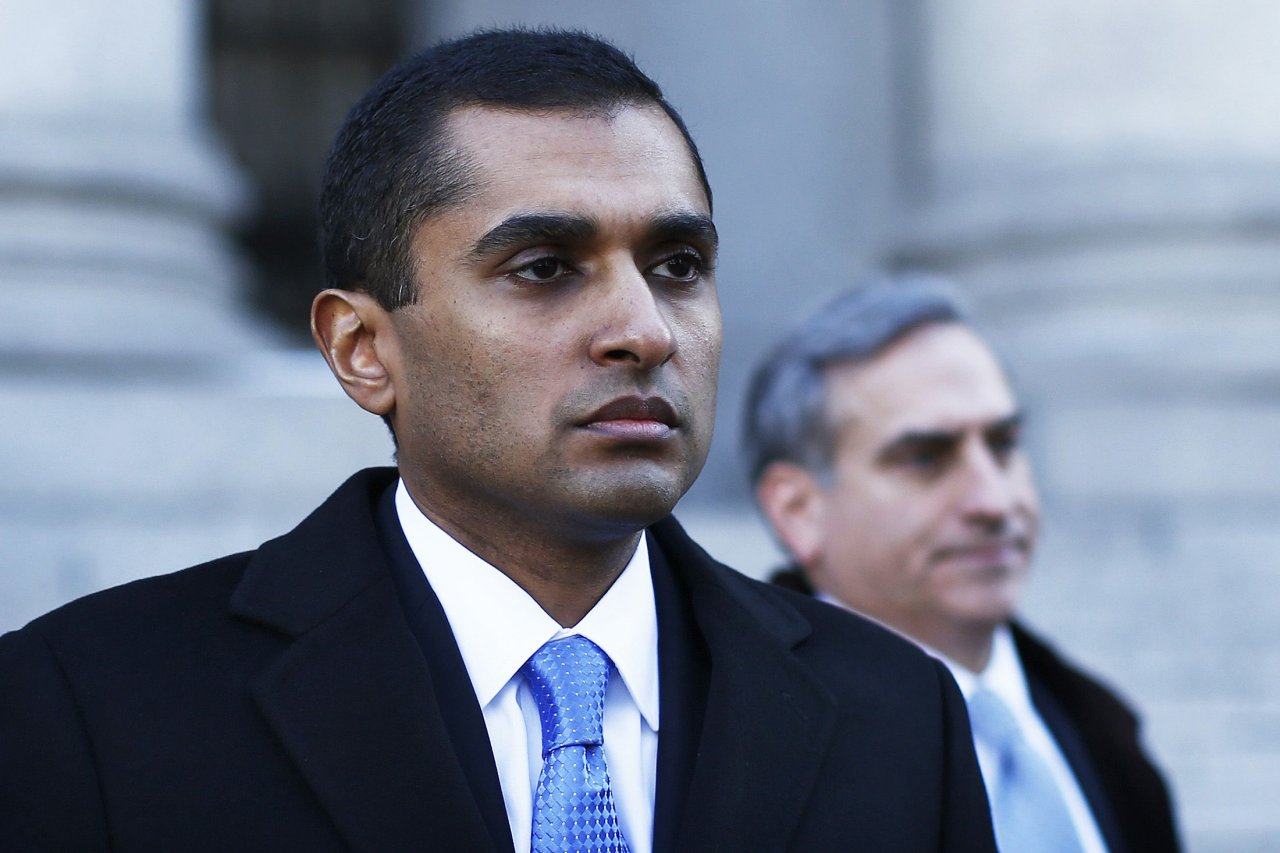It was supposed to be another victory lap for Manhattan U.S. Attorney Preet Bharara, whose insider-trading winning streak hit 79 after a jury found hedge fund trader Mathew Martoma of SAC Capital Advisors LP guilty of insider trading, setting him up for a lengthy prison term.
But as the government's probation department recommends a sentence that would be the longest ever for insider trading—anywhere from 15 to 20 years—U.S. judges, federal public defenders, the U.S. Sentencing Commission, the U.S. Department of Justice and the American Bar Association are increasingly calling into question the nation's sentencing guidelines, which, in the words of one federal judge, "are just too goddamn severe."
While Jed S. Rakoff, a federal senior judge for the Southern District of New York, where many of Wall Street's highest-profile cases are heard, has been extremely vocal about the lack of high-level executives going to prison in the wake of the financial crisis, he also believes that federal sentencing guidelines are too simplistic, too harsh and often fail to offer punishments nuanced enough to fit the crime.
"Insider trading is a serious offense, and it is very important there is prison time to send a strong message," he tells Newsweek. "But the arithmetic behind the sentencing calculations is all hocus-pocus—it's nonsensical, and I mean that sincerely. It gives the illusion of something meaningful with no real value underneath."
The biggest quibble judges have with white-collar sentencing guidelines is the fact that prison terms are heavily weighted toward how much money is made or lost on a financial crime, regardless of the circumstances of the offense, whether it is insider trading, embezzlement, a Ponzi scheme or some other type of financial fraud, which, according to the U.S. Sentencing Commission, all of which make up about 11 percent of the annual federal caseload.
"The way it's set up now, you may be the lead offender in a crime or the low man on the totem pole and still get the same sentence," Rakoff says.
Rakoff sent former Goldman Sachs director Rajat Gupta to prison for two years in 2012 after Gupta passed along inside information about the bank at the height of the financial crisis to the former head of hedge fund Galleon Group, Raj Rajaratnam, who's now serving an 11-year prison sentence—one of the longest ever for insider trading in U.S. history.
Martoma could set the new record if he gets the sentence the government is now seeking. The U.S. sentencing guidelines suggest a minimum of 11 to 15 years (140 to 175 months) for Martoma, who made a record $276 million off an insider-trading scheme at the Stamford, Connecticut, hedge fund. The government's probation department is seeking a longer sentence, likely reflecting the fact that Martoma's insider trades were part of an organized effort at SAC, which increases the severity of the punishment. His lawyer, Richard Strassberg, argues such a sentence would be harsh given his contention that he acted "based on one piece of information from one tipper about one event," according to a filing ahead of the sentencing, now set for July 28.
In the filing, Strassberg called the probation department's recommended prison sentence for Martoma, age 40, "outrageous." Many judges and legal experts agree.
The problem, says federal Judge John Gleeson, who represents the Eastern District of New York City, has built up over time, as congressional directives and statutes—often pushed by public pressure to treat offenders more aggressively and rigorously—have acted as what he calls a "one-way ratchet," boosting the austerity and length of sentences ever higher.
"Over the past 25 years, the way the political winds were blowing, whenever there was a change, it was a change to add severity," he tells Newsweek. The result: more and longer prison sentences for financial crimes (although, as Rakoff observes, not for the high-ranking Wall Street executives and CEOs) and prison sentences ranging from a few months to more than a century.
U.S. judges would have been forced to hew to the draconian sentencing guidelines indefinitely if not for a watershed moment in 2005, in the form of an appeal before the Supreme Court brought by a crack cocaine dealer.
Wisconsin native Freddie Booker received a 30-year prison sentence for drug dealing after a jury heard evidence that he had 92.5 grams of crack cocaine in a duffel bag with intent to distribute. A judge, in a post-trial sentencing, decided Booker likely had an additional 566 grams and had obstructed justice. Booker appealed, stating that the 30-year sentence reflected facts found by the judge independent of the jury's findings, violating his Sixth Amendment right to a fair trial by jury.
In 2005, the Supreme Court agreed, noting that the judge's independent determinations, as well as mandatory sentencing guidelines were unconstitutional. From then on, federal sentencing guidelines were offered only as a guide—and a new standard of sentencing was born.
Prior to the Supreme Court's decision, all sentences deviating from the federal guidelines had to be justified by extraordinary circumstances. At the time of the Booker decision, 70.9 percent of all federal sentences across categories hewed faithfully to the guidelines. Before the end of 2005, that number dropped to 61.6 percent. Since then it has fallen to 51.2 percent for fiscal 2013, the latest year for which data are available from the U.S. Sentencing Commission.
Says Gleeson, "I know many of us welcome this change. Post-Booker, we're actually able to look at aspects of the offense that make sense to the average layman. Instead of having the guidelines do all the thinking for us, we can actually be judges. We can now consider the person before us."
Data from the U.S. Sentencing Commission, which tracks cases from all 94 of the nation's judicial districts, show that in the decade from fiscal 2003 to 2012, the median amount of money involved in financial fraud cases—including insider trading—in the U.S. increased fivefold from $18,000 per case to $95,000 per case. That means recommended prison sentences also leapt higher, since prison terms hinge on the cost of the crime.

In a sign that judges have been pushing back against these lengthy prison terms, however, the sentences they have been meting out have been lowballing government guidelines over the past decade. In 2003, about 83.4 percent of all sentences for financial fraud offenses, including insider trading, fell within the government guidelines, according to commission data. That number has now fallen to about half of all sentences, with a large portion of them falling below the range.
"Since the Supreme Court decision, judges have used their greater discretionary powers more and more, there's no question about that," says Jonathan Wroblewski, director of the office of policy and legislation at the U.S. Department of Justice. While judges such as Rakoff and Gleeson suggest increasing disparities across sentences reflect a much-needed move away from the one-size-fits-all mentality of the federal guideline system, others fear the disparities may be a problem.
"There are troubling trends in sentencing, including growing disparities among circuits and districts and demographic disparities, which the commission has been evaluating," Judge Patti Saris, chairman of the U.S. Sentencing Commission, warned the U.S. House of Representatives' Subcommittee on Crime, Terrorism and Homeland Security more than two years ago. These demographic disparities include, the data show, possible gender, racial and educational biases.
Last September, Saris told an audience at the commission's Fifth Symposium on Crime and Punishment at the John Jay College of Criminal Justice in New York that 61.5 percent of financial offenders are being put in prison, up from 44.9 percent a decade earlier.
At the same symposium, Michael Caruso, a federal public defender in the Southern District of Florida, bemoaned federal sentencing guidelines, stating, "Over the years, in dealing with the fraud guidelines in particular, we have identified various problems because we would respectfully contend that the guideline is tough, but not fair."
The concerns come at a time when insider-trading cases—a subsection of the U.S. Sentencing Commission's broader financial fraud category—have nearly tripled over the past three years (2011 to 2013), compared with the prior three years (2008 to 2010), according to commission data.
In sum, insider-trading cases are on the rise, with the money involved and the prison sentences growing even as judges continue to abandon federal sentencing guidelines to minimize sentences they believe to be too punitive. Sentences are "diverging, that's for sure, and, to some extent, that reflects an absence of respect for the guidelines," Gleeson says.
One of the main reasons judges are so queasy about imposing lengthy sentences, Wroblewski tells Newsweek, is that "the vast majority of economic crimes and offenses prosecuted in federal court involve less than a million dollars of loss, and most of the offenders are being convicted for the first time."
In addition, the guidelines are far too complex, with 18 offense characteristics and four cross-references that, says Caruso, "fail to adequately capture mitigating factors" and are "subject to prosecutorial manipulation."
Sentences for economic crimes are "labyrinthine," with a scoring system of 1 to 43 (judges also find this numeric system arbitrary) that, while complex, is anything but scientific, Gleeson says. "There are 45 to 50 ways of adjusting the guidelines range for a fraud sentence," he tells Newsweek, adding, "Any given dimension of this could be a three-hour conversation."
While Saris declined to comment to Newsweek for this story, the commission is taking public comment through late July on how it might revisit the federal sentencing guidelines for economic crimes and the impact of financial crimes on the market as one of its biggest priorities for 2015.
In the meantime, Rakoff, Gleeson, Wroblewski and other judges, academics, legal organizations and members of government, in conjunction with the American Bar Association, are banding together to propose a new federal guideline system for economic crimes "to bring more sanity to this process," Gleeson says.
"As they stand, the guidelines should be scrapped in their entirety and replaced with a fairer, multifactor system that would be much more flexible and allow for the full range of experiences and circumstances that may surround financial crimes," Rakoff says.
In sentencing former Goldman director Gupta, Rakoff favored a lower sentence than the six to eight years initially floated, because Gupta had a history of philanthropy and a phalanx of big-name supporters, like Bill Gates and Deepak Chopra, who wrote more than 100 letters of support.
Martoma also has seen about 100 letters of support in the lead-up to his sentencing, which will be presided over by Judge Paul G. Gardephe, who is seen by his colleagues as a measured, "middle-of-the-road" type.
Indeed, with judges' new discretionary powers post-Booker, controversial cases are getting a marked increase in pre-sentence lobbying by lawyers with both the prosecution and the defense. "Since Booker, written letters from the plaintiff, defendant or even victims are more important, because judges have greater power to honor them or not honor them," Wroblewski says.
Martoma is one of eight managers and analysts convicted in a seven-year probe of SAC, which, last year, pleaded guilty to reaping hundreds of millions of dollars in illegal profits and agreed to pay a settlement of $1.8 billion for fostering a culture of criminal behavior at the firm. (According to the Federal Bureau of Investigation, SAC actively recruited traders with access to inside information "who had proven networks of public company contacts." It cited one instance where a potential hire was recommended "in part, because he had, according to an e-mail, 'a house in the Hamptons with the CFO of a Fortune 100 industrial sector company.'") A former manager at the fund, Michael Steinberg, was sentenced earlier this year to three and a half years in prison.
SAC has since metamorphosed from a hedge fund into a family office, renamed Point72 Asset Management, managing $9 billion to $10 billion of the assets of SAC's founder, Steven A. Cohen, and the fund's employees. While evidence during Martoma's trial revealed he shared the tip with Cohen that allowed him to make his $276 million windfall for SAC, along with a $9.3 million bonus, Cohen has not been charged and has denied any wrongdoing.
The Securities and Exchange Commission is now investigating in an administrative proceeding whether Cohen failed to properly supervise Martoma and other traders at his firm.





























